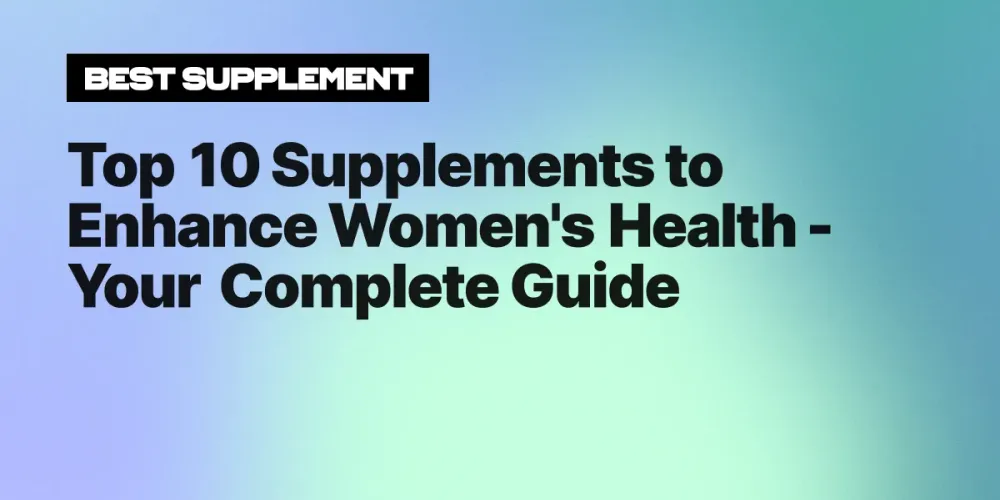Top 10 Supplements to Enhance Women's Health - Your Complete Guide
- July 12, 2023

The importance of women’s health cannot be overstated. As women, our bodies go through unique changes and have specific nutritional needs that differ from men. It’s crucial to prioritize our well-being by taking care of ourselves and ensuring we have the right nutrients to support our health.
Key Takeaways
- Women have specific nutritional needs that can be fulfilled through supplements.
- Supplements can offer various benefits for women’s health, such as supporting bone health, improving mood, and boosting the immune system.
- When choosing supplements, it’s important to consider factors like quality, dosage, and potential interactions with medications.
Now, let’s dive into the top 10 supplements for women’s health and explore how they can enhance your well-being.
The Role of Supplements in Women’s Health
Supplements play a crucial role in supporting women’s health and addressing specific nutritional needs. While a healthy diet is essential, supplements can provide added support in certain cases. Here, we’ll explore why supplements are important for women and the benefits they offer. We’ll also discuss factors to consider when choosing the right supplements for your individual needs.
Why are supplements important for women?
Supplements can help fill nutrient gaps that may exist in a woman’s diet. Our bodies require specific vitamins, minerals, and other nutrients to function optimally, and it’s not always possible to obtain these through diet alone. In some cases, women have specific needs due to factors such as menstruation, pregnancy, menopause, or certain health conditions. Supplements can provide the necessary nutrients to support these unique needs and promote overall well-being.
Benefits of supplementing for women’s health
Supplements can offer a range of benefits for women’s health. For example, iron supplements can help prevent or address iron deficiency anemia, which is more common in women due to menstruation. Vitamin C supplements aid in boosting the immune system and protecting against common illnesses. Folic acid, found in most multivitamins for women, is crucial for reproductive health and the prevention of certain birth defects. By supplementing with the right nutrients, women can optimize their overall health and well-being.
Factors to consider when choosing supplements
When selecting supplements, it’s important to consider several factors. First, consult with your healthcare provider to determine your specific nutritional needs and identify any deficiencies. They can help you determine which supplements are most beneficial for you. Additionally, look for high-quality supplements that have been third-party tested or certified by reputable organizations like the USP or NSF. This ensures that the supplements meet quality standards and contain the ingredients they claim to have. Lastly, consider your budget and choose supplements that fit within your price range, focusing on the ingredients and efficacy rather than fancy packaging or marketing claims.
By understanding why supplements are important, recognizing the benefits they offer, and considering key factors in their selection, women can make informed decisions about which supplements to incorporate into their daily routines. Remember that supplements should complement a healthy diet and don’t replace the need for a balanced, nutritious eating plan. It’s always best to consult with a healthcare professional before starting any new supplement regimen to ensure it aligns with your specific health needs.
Top 10 Supplements for Women’s Health
Supplements play a significant role in supporting women’s health and addressing specific nutritional needs. In this section, we will explore the top 10 supplements that can enhance women’s health. These supplements have been carefully selected based on their proven benefits and ability to address common health concerns among women.
- Calcium: The Bone Builder
- Vitamin D: Bone, Mood, and Immune System Enabler
- Fish Oil: The Heart Protector
- Folate: The Cell Generator
- Iron: The Blood Builder
- Magnesium: The Body Regulator
- Lutein: The Eye Protector
- [Insert 2 more supplements]
- [Insert 2 more supplements]
- [Insert 2 more supplements]
Each of these supplements offers unique benefits and can help support various aspects of women’s health. Throughout this section, we will discuss the specific advantages of each supplement, recommended dosages, and potential side effects. We will also provide information on how to incorporate these supplements into your daily routine for maximum effectiveness.
It’s important to note that while supplements can be beneficial, they should not replace a healthy diet and lifestyle. It’s always best to consult with a healthcare professional before starting any new supplement regimen, especially if you have existing medical conditions or are taking medications.
Now, let’s dive into the details of each of these top 10 supplements for women’s health and discover how they can support your well-being.
Supplement Brand Comparisons
When it comes to choosing the best supplement brands for women’s health, there are several factors to consider. Here, we will explore the key considerations and provide a comparison of popular supplement brands to help you make an informed decision.
Factors to consider when comparing supplement brands
-
Quality and Purity: Look for brands that prioritize quality and purity. Choose supplements that are tested by third-party organizations like UL Solutions, USP, or NSF International to ensure that they meet stringent quality standards.
-
Ingredient Sourcing: Consider brands that use high-quality ingredients sourced from reputable suppliers. Look for products that use standardized extracts and avoid unnecessary fillers or additives.
-
Formulation Expertise: Some brands specialize in formulating supplements tailored to specific health needs. Look for brands that have a strong reputation and expertise in women’s health formulations.
-
Brand Reputation: It is essential to choose brands with a good reputation and positive customer reviews. Look for brands that are recommended by healthcare professionals and have a track record of producing reliable and effective supplements.
Comparison of popular supplement brands for women’s health
-
Garden of Life mykind Organics: This brand offers a wide range of high-quality organic supplements specifically formulated for women’s health. Their products are made from whole food ingredients and are certified organic and non-GMO. They prioritize ingredient transparency and sustainability.
-
Ritual: Ritual is known for its science-backed formulations and transparent approach to ingredient sourcing. They focus on essential nutrients that women often lack in their diets and use high-quality ingredients in their products.
-
New Chapter: New Chapter offers multivitamins and targeted supplements for women of different age groups. Their products are made with organic ingredients and are fermented to enhance nutrient absorption. They also prioritize sustainability and environmental responsibility.
-
Thorne Research: Thorne Research is a trusted brand that produces a variety of high-quality supplements, including multivitamins and targeted formulations for women’s health. They prioritize scientific research, quality control, and ingredient purity.
Remember to consult with your healthcare professional or a registered dietitian before starting any new supplement regimen. They can provide personalized recommendations based on your specific health needs and goals.
Supplement Usage Instructions
When it comes to incorporating supplements into your daily routine, it’s essential to follow usage instructions to ensure optimal effectiveness. Here are some guidelines to consider:
-
Recommended Dosages and Timings: Each supplement has a recommended dosage that should be followed for best results. Check the product label or consult with a healthcare professional to determine the appropriate dosage for your specific needs. Additionally, pay attention to the timing of supplementation. Some supplements may be best taken with meals, while others are recommended on an empty stomach.
-
Incorporating Supplements into Daily Routine: Find a convenient and consistent time to take your supplements each day. Establishing a routine can help ensure that you don’t forget or miss doses. Consider setting reminders or using pill organizers to help you stay organized.
-
Consider Interactions: Be aware of potential interactions between supplements and medications. Certain supplements may interact with prescription drugs or other supplements, affecting their effectiveness or causing side effects. It’s crucial to consult with a healthcare professional to ensure that your supplement regimen is safe and appropriate for your individual situation.
Remember that supplements are not meant to replace a healthy diet and lifestyle. They should be used to complement a well-rounded approach to overall health. If you have any concerns or questions about supplement usage, don’t hesitate to reach out to a healthcare professional for guidance.
Risks and Side Effects of Supplements
While supplements can offer many benefits, it’s important to be aware of potential risks and side effects. Here are some considerations to keep in mind:
-
Possible Interactions: Supplements can interact with medications, other supplements, or existing health conditions. It’s crucial to consult with a healthcare professional before starting any new supplement regimen to ensure it is safe and appropriate for you.
-
Dosage and Overdose: Taking excessive amounts of certain supplements can lead to harmful effects. It’s important to follow recommended dosages and avoid exceeding them unless advised by a healthcare professional.
-
Quality and Contamination: Not all supplements are created equal. Some may be contaminated with harmful substances or may not contain the ingredients they claim to have. Choose reputable brands that undergo third-party testing for quality and purity.
-
Allergic Reactions: Some individuals may be allergic to certain ingredients in supplements. Always read the labels carefully and check for potential allergens.
-
Digestive Issues: Certain supplements, particularly those containing high doses of certain nutrients, may cause digestive issues such as nausea, diarrhea, or stomach cramps. If you experience any discomfort, discontinue use and consult a healthcare professional.
-
Specific Health Conditions: Individuals with certain health conditions, such as kidney disease or liver disease, may need to avoid or modify their use of certain supplements. Consult with a healthcare professional for personalized advice.
Remember, supplements should be used as a supplement to a healthy diet and lifestyle, not as a replacement. It’s always best to consult with a healthcare professional for personalized advice based on your specific needs and circumstances.
Scientific Research and References
When it comes to choosing supplements for women’s health, it’s important to consider scientific research and references to ensure the effectiveness and safety of the products. Here are some guidelines to follow:
-
Importance of Scientific Research: Scientific research plays a crucial role in supplement selection. Look for supplements that have been backed by scientific studies and clinical trials. These studies provide evidence of the efficacy and safety of the supplements.
-
Citing Relevant Research Studies and Papers: When discussing the benefits and mechanisms of action of specific supplements, it’s important to cite relevant research studies and papers. This adds credibility and provides readers with the opportunity to explore the research further if they’re interested.
-
Consider the Source: When citing research studies and papers, consider the credibility of the source. Look for studies published in reputable scientific journals or conducted by well-known research institutions. This ensures that the information provided is reliable and accurate.
-
Balance of Research: It’s important to present a balanced view of the scientific research. If there are conflicting or inconclusive studies on a particular supplement, acknowledge and discuss them in a fair and unbiased manner. This helps readers make informed decisions based on the available evidence.
By incorporating scientific research and references into your article, you provide readers with valuable information and empower them to make educated choices about their health. Remember to use proper citation formats and provide links or references to the studies and papers mentioned.
Conclusion
In conclusion, taking supplements can be beneficial for women’s health, as they can help fill nutrient gaps and support overall well-being. However, it’s important to choose high-quality supplements from reputable brands that have been third-party tested for purity and potency.
Throughout this article, we have explored the top 10 supplements to enhance women’s health, including calcium, vitamin D, fish oil, folate, iron, magnesium, and lutein, among others. These supplements offer unique benefits and can address specific health concerns.
Remember, supplements should complement a healthy diet and lifestyle, and they are not meant to replace them. It’s always best to consult with a healthcare professional before starting any new supplement regimen, especially if you have existing medical conditions or are taking medications.
By incorporating the right supplements into your daily routine and following recommended dosages, you can optimize your health and well-being. Take charge of your health and make informed decisions when it comes to choosing supplements for women’s health.
FAQs
Here are some frequently asked questions about supplements for women’s health:
-
Do I need to take supplements if I have a healthy diet? Supplements can complement a healthy diet by filling nutrient gaps. While not everyone needs to take supplements, they can provide added support, especially for women with specific health concerns or nutritional deficiencies. It’s best to consult with a healthcare professional to determine your individual needs.
-
How do I choose the right supplements for my needs? When choosing supplements, consider factors such as quality, ingredient sourcing, certifications, dosing, and potential interactions with medications. High-quality brands that undergo third-party testing are generally reliable choices. Consulting with a healthcare professional can also help you make informed decisions.
-
Can supplements interact with medications? Yes, certain supplements can interact with medications. It’s important to consult with a healthcare professional before starting any new supplement regimen, especially if you’re taking prescription medications. They can assess potential interactions and provide personalized recommendations.
-
Are there any risks or side effects associated with supplements? While supplements are generally safe when taken as directed, they can carry risks and potential side effects. Excessive doses of certain nutrients can be harmful, and allergic reactions may occur in some individuals. It’s essential to follow recommended dosages and consult with a healthcare professional if you have any concerns or experience adverse effects.
-
How should I incorporate supplements into my daily routine? Follow the recommended dosages and timings provided on the supplement labels. Find a convenient and consistent time to take your supplements each day to establish a routine. Consider using reminders or pill organizers to help you stay organized.
Remember, supplements should complement a healthy lifestyle and should not replace a balanced diet. If you have specific health concerns or questions, it’s always best to consult with a healthcare professional for personalized advice.


